'Animal Farm' Questions for Study and Discussion
Hulton Archive / Getty Images
- Study Guides
- Authors & Texts
- Top Picks Lists
- Best Sellers
- Plays & Drama
- Shakespeare
- Short Stories
- Children's Books
- M.A., English Literature, California State University - Sacramento
- B.A., English, California State University - Sacramento
Since George Orwell 's 1945 novel " Animal Farm " is such a complex work, you can better understand its themes and plot devices by working your way through study questions. Use these "Animal Farm" discussion questions as a guide to better comprehending the book, but for context, first, make sure you understand the gist of the story and its related history.

'Animal Farm' in Context
In short, "Animal Farm" is an allegory that depicts the rise of Joseph Stalin and communism in the former Soviet Union. Orwell was dismayed by the favorable image of World War II-era and the post-war Soviet Union. He viewed the USSR as a brutal dictatorship whose people were suffering under Stalin's rule. In addition, Orwell was angered by what he viewed as acceptance of the Soviet Union by Western countries. Given this, Stalin, Hitler , and Karl Marx are all represented in the novel , which ends with the famous quote , “All animals are equal, but some animals are more equal than others.”
Questions for Review
With the context of the book in mind, prepare to answer the "Animal Farm" discussion questions below. You can review them before you read the book, as you read it, or afterward. In any case, looking at these questions will improve your comprehension of the material.
Your answers may reveal why the book has endured for generations. Discuss with your classmates or a friend who's familiar with the book. You may have somewhat different takes on the novel, but analyzing what you've read is a great way to connect with the material.
- What is important about the title?
- Why do you think Orwell chose to represent political figures as animals? Why did he choose a farm as the novel's setting?
- What if Orwell had chosen jungle or marine animals to represent the political figures?
- Is it important to know the world history of the mid- and late-1940s to fully understand what Orwell is trying to portray?
- "Animal Farm" has been described as a dystopian novel. What are some other examples of fictional works with dystopian settings?
- Compare "Animal Farm" with Orwell's other famous cautionary tale, " 1984 ." How similar are the messages of these two works? What's different about them?
- What are the symbols in "Animal Farm?" Are they easily recognized by readers who don't know the historical context of the novel?
- Can you discern an authorial voice (a character who speaks the author's point of view) in "Animal Farm?"
- How essential is the setting to the story? Could the story have taken place somewhere else and still made the same points?
- Does the story end the way you expected? What other outcomes could there have been for "Animal Farm?"
- What would a sequel to "Animal Farm" have looked like? Were Orwell's fears about Stalin realized?
- Top Conservative Novels
- 'Life of Pi' by Yann Martel: Book Club Discussion Questions
- 10 Classic Novels for Teens
- 'Animal Farm' Overview
- 'Animal Farm' Themes and Symbols
- George Orwell: Novelist, Essayist and Critic
- Top Books: Modern Russia - The Revolution and After
- 'To Kill a Mockingbird' Book Club Discussion Questions
- 'Animal Farm' Quotes
- 10 Works of 1940s Literature Still Taught Today
- 'Animal Farm' Characters: Descriptions and Analysis
- R.J. Palacio's "Wonder" — Book Club Discussion Questions
- 'Animal Farm' Quotes Explained
- 5 Mind-Blowing Ways to Read “Of Mice and Men”
- '1984' Questions for Study and Discussion
- 50 General Book Club Questions for Study and Discussion
The Book Report Network
- Bookreporter
- ReadingGroupGuides
- AuthorsOnTheWeb

Sign up for our newsletters!
Find a Guide
For book groups, what's your book group reading this month, favorite monthly lists & picks, most requested guides of 2023, when no discussion guide available, starting a reading group, running a book group, choosing what to read, tips for book clubs, books about reading groups, coming soon, new in paperback, write to us, frequently asked questions.
- Request a Guide
Advertise with Us
Add your guide, you are here:, animal farm, reading group guide.

- Discussion Questions
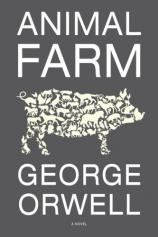
Animal Farm by George Orwell
- Publication Date: June 1, 1996
- Paperback: 128 pages
- Publisher: Plume
- ISBN-10: 0452277507
- ISBN-13: 9780452277502
- About the Book
- Reading Guide (PDF)
George Orwell
- Bibliography
- Birthday: June 25, 1903
Find a Book
View all » | By Author » | By Genre » | By Date »
- readinggroupguides.com on Facebook
- readinggroupguides.com on Twitter
- readinggroupguides on Instagram

- How to Add a Guide
- Privacy Policy
- Cookie Policy
- Newsletters
Copyright © 2024 The Book Report, Inc. All Rights Reserved.
- Skip to primary navigation
- Skip to main content
- Skip to primary sidebar
- Skip to footer
Don't Miss a Post! Subscribe

- Book Summaries
- Books for Teachers
- Research Methodology Books
- Themed Book Lists
- Beyond Books

Selected Reads
A blog for bibliophiles covering everything related to books from reviews and summaries to quotes and open articles.
Animal Farm Book Club Questions
By Med Kharbach, PhD | Published: May 15, 2023 | Updated: May 15, 2023
After thoroughly enjoying George Orwell’s “Animal Farm” not once, but twice, I found myself captivated by its powerful themes and timeless relevance. This allegorical masterpiece has taught me so much about society, politics, and the human condition that I couldn’t help but share my insights and passion for this novel with all of you.
In a previous blog post titled Animal Farm Summary , I reviewed the intriguing story of “Animal Farm” and analyzed its rich symbolism and narrative depth. Additionally, I curated a collection of my favorite Animal Farm quotes from the novel in another post, showcasing the memorable lines that left a lasting impact on me. Today, I’m excited to bring you yet another post dedicated to this literary classic—this time focused on book club discussion questions.
In this blog post, I will provide a thoughtfully crafted set of book club questions designed to spark engaging and thought-provoking conversations about “ Animal Farm .” These questions will delve into the novel’s allegorical nature, the role of language and power, the significance of its characters, and its continued relevance in today’s world.
Whether you’re hosting a book club meeting or simply looking to deepen your understanding of this iconic work, I hope these discussion questions will inspire lively debates and foster a greater appreciation for George Orwell’s timeless wisdom. But first, let me share with you a quick synopsis of the novella.
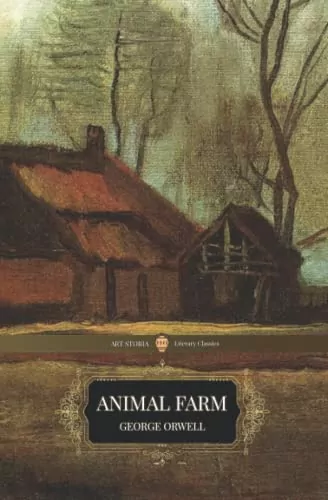
Animal Farm synopsis
“Animal Farm” is a thought-provoking and satirical novella by George Orwell, published in 1945. Set on a British farm, the story serves as a powerful allegory for the Russian Revolution and the rise of Stalinist totalitarianism.
The novel begins when the animals of Manor Farm, led by the pigs, stage a rebellion against their oppressive human owner, Mr. Jones. With their newfound freedom, the animals establish a self-governed society based on the principles of Animalism, which promotes equality and cooperation among all animals. The Seven Commandments of Animalism are painted on the barn wall to guide their new life.
However, as time passes, the pigs, particularly Napoleon and Snowball, start to consolidate power and manipulate the other animals for their own benefit. They alter the commandments to suit their needs, and eventually, Napoleon drives Snowball out of the farm to become the sole leader. Under Napoleon’s rule, the farm’s initial ideals of equality and freedom are eroded as the pigs grow increasingly corrupt and tyrannical.
The story culminates with the pigs transforming into indistinguishable counterparts of the humans they once despised. Through this allegorical tale, Orwell masterfully explores themes of power, corruption, and betrayal, offering a timeless warning against the dangers of totalitarianism and the importance of vigilance in the face of oppressive regimes.
1. How does Orwell use the allegory of animals on a farm to represent the Russian Revolution and its aftermath? What specific characters and events in the novel parallel real-life historical figures and occurrences?
2. What role does language play in the manipulation and control of the animals by the ruling class? How do the pigs use language to shape the animals’ understanding of the world and solidify their power?
3. Explore the theme of power and corruption in “Animal Farm.” How do the pigs gradually become more corrupt, and what are the consequences of this corruption for the other animals?
4. How does the novel illustrate the concept of “divide and rule”? In what ways do the pigs use this tactic to maintain their authority over the other animals?
5. Discuss the significance of the Seven Commandments in the story. How do they evolve and change over time, and what does this reveal about the nature of power and control?
6. In what ways do the animals contribute to their own oppression? How might they have been able to prevent the pigs from gaining total control?
7. What role does education play in the story? How might the outcome have been different if all the animals were educated and literate?
8. How does Orwell use humor and satire to convey his message in “Animal Farm”? What are some examples of these techniques, and how do they contribute to the overall impact of the novel?
9. Analyze the character of Boxer, the hardworking and loyal horse. What does Boxer symbolize, and what is the significance of his ultimate fate?
10. Do you think “Animal Farm” remains relevant in today’s world? In what ways can the novel’s themes and messages be applied to contemporary issues of power, corruption, and inequality?
Feel free to use these questions as a starting point and tailor them to your book club’s specific interests and insights. Enjoy your discussion!
Share this:
Related posts.
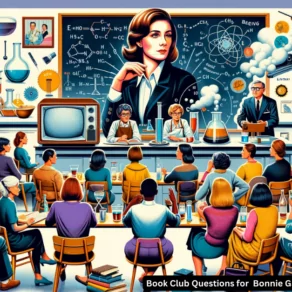
Meet Med Kharbach, PhD
Dr. Med Kharbach is an influential voice in the global educational landscape, with an extensive background in educational studies and a decade-long experience as a K-12 teacher. Holding a Ph.D. from Mount Saint Vincent University in Halifax, Canada, he brings a unique perspective to the educational world by integrating his profound academic knowledge with his hands-on teaching experience. Dr. Kharbach's academic pursuits encompass curriculum studies, discourse analysis, language learning/teaching, language and identity, emerging literacies, educational technology, and research methodologies. His work has been presented at numerous national and international conferences and published in various esteemed academic journals.
Join our mailing list
Subscribe to our email list for bite-sized book summaries, curated recommendations, and exclusive content.

Subscribe for exclusive resources .
You have successfully joined our subscriber list.
- Animal Farm
George Orwell
- Literature Notes
- Essay Questions
- Animal Farm at a Glance
- Book Summary
- About Animal Farm
- Character List
- Summary and Analysis
- Character Analysis
- Character Map
- George Orwell Biography
- Critical Essays
- The Russian Revolution
- Major Themes
- Full Glossary
- Practice Projects
- Cite this Literature Note
Study Help Essay Questions
1. Compare the lives of the animals when they live under Jones and under Napoleon. In what ways has Napoleon proven himself a similar tyrant?
2. Closely examine old Major's speech to the animals in Chapter 1 and discuss the ways in which he uses language to persuade his listeners.
3. Explain how one of the novel's minor characters (such as Mollie or Moses) illuminates Orwell's major themes and issues.
4. Examine Orwell's tone when describing the way the animals think of themselves under Napoleon's rule: How does Orwell's tone add to the novel's humor?
5. Explain how the human characters contribute to the novel's themes and issues.
6. Based upon Animal Farm , what deductions can a reader make about the kind of political system of which Orwell would approve?
Previous Full Glossary
Next Practice Projects

Animal Farm
George orwell, everything you need for every book you read..
Welcome to the LitCharts study guide on George Orwell's Animal Farm . Created by the original team behind SparkNotes, LitCharts are the world's best literature guides.
Animal Farm: Introduction
Animal farm: plot summary, animal farm: detailed summary & analysis, animal farm: themes, animal farm: quotes, animal farm: characters, animal farm: symbols, animal farm: theme wheel, brief biography of george orwell.
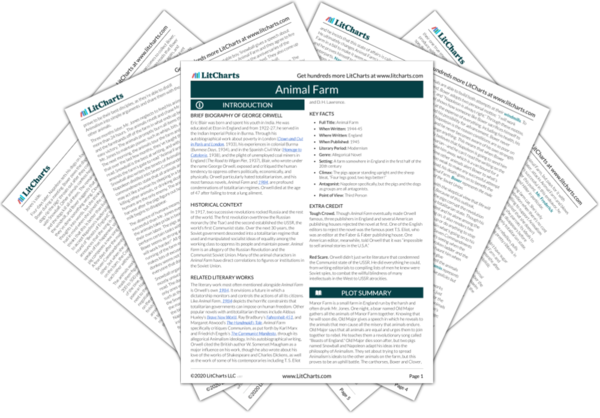
Historical Context of Animal Farm
Other books related to animal farm.
- Full Title: Animal Farm
- When Written: 1944-45
- Where Written: England
- When Published: 1945
- Literary Period: Modernism
- Genre: Allegorical Novel
- Setting: A farm somewhere in England in the first half of the 20th century
- Climax: The pigs appear standing upright and the sheep bleat, “Four legs good, two legs better!”
- Antagonist: Napoleon specifically, but the pigs and the dogs as groups are all antagonists.
- Point of View: Third Person
Extra Credit for Animal Farm
Tough Crowd. Though Animal Farm eventually made Orwell famous, three publishers in England and several American publishing houses rejected the novel at first. One of the English editors to reject the novel was the famous poet T.S. Eliot, who was an editor at the Faber & Faber publishing house. One American editor, meanwhile, told Orwell that it was “impossible to sell animal stories in the U.S.A.”
Red Scare. Orwell didn’t just write literature that condemned the Communist state of the USSR. He did everything he could, from writing editorials to compiling lists of men he knew were Soviet spies, to combat the willful blindness of many intellectuals in the West to USSR atrocities.


- Getting Started
- Start a Book Club
- Book Club Ideas/Help▼
- Our Featured Clubs ▼
- Popular Books
- Book Reviews
- Reading Guides
- Blog Home ▼
- Find a Recipe
- About LitCourse
- Course Catalog
Animal Farm (Orwell)
Animal Farm George Orwell ~125 pp. (varies by publisher) Summary It has been said that Animal Farm is a byproduct of George Orwell's long-held hatred of totalitarianism. Clearly, in reading Animal Farm , those familiar with history will find pointed parallels to Stalin's dictatorship and reign of terror. In this case, however, the principal characters are indeed animals who, possessed of human or near-human traits and abilities, set out to create a Utopian society devoid of human influence. In the novel's opening scene, Old Major, the "prized Middle White Boar," and the oldest and wisest of all beasts on Manor Farm, gathers the animals and tells them of a vision that came to him in a dream. In essence, he has foreseen a world in which animals rule themselves, live among one another equally, and work only toward the betterment of their own. Inspired by these words, and chaffing under their human master, Mr. Jones, the animals gather secretly and plan rebellion. Led by two of the farm's pigs, Napoleon and Snowball (for the pigs soon prove the cleverest of all the animals on the farm), the animals mount a successful attack, rid themselves of Jones and his human counterparts, and take control of the farm. With new found freedom and a sense of optimism toward the future, the animals set forth in re-establishing Manor Farm, now renamed Animal Farm, as their own. Under the leadership of the pigs, farm labor is organized and divided among the animals, and a list of seven commandments is established—deemed unalterable—under which all animals on the farm would adhere. Slowly, however, some of the animals become wary of the pigs, who don't necessarily work, but supervise, and whose pronouncements become law despite little or no discussion. The pigs' usurpation of power continues to the point where their rule is questioned only upon pain of death. Consequently, Old Major's vision of a peaceful brotherhood of animals has mutated into a world where reality and truth are molded and disseminated to support the ruling class. With biting irony and sharp insight into human nature, Orwell illustrates the dangers inherent in a complacent citizenry and the consequences of unchecked power. To this day, Animal Farm remains a haunting vision—the lessons of which might be heeded by all concerned with issues of self-determination and political process. ( From Penguin Classics; cover image, above. )
- Next >>
LitLovers © 2024
Animal Farm
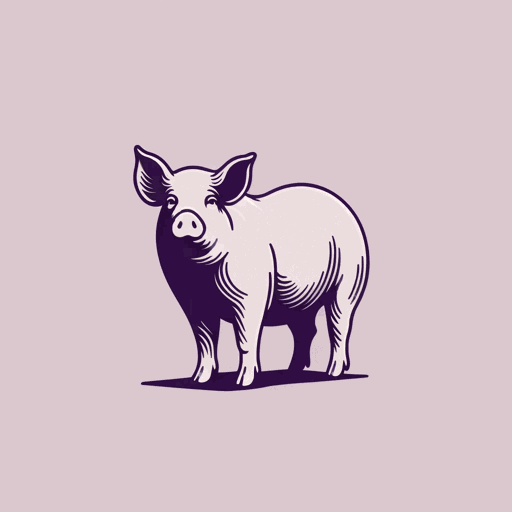
70 pages • 2 hours read
A modern alternative to SparkNotes and CliffsNotes, SuperSummary offers high-quality Study Guides with detailed chapter summaries and analysis of major themes, characters, and more. For select classroom titles, we also provide Teaching Guides with discussion and quiz questions to prompt student engagement.
Chapter Summaries & Analyses
Chapters 1-4
Chapters 5-7
Chapters 8-10
Character Analysis
Symbols & Motifs
Important Quotes
Essay Topics
Discussion Questions
Summary and Study Guide
Published in 1945, Animal Farm by George Orwell (1903-1950) achieved immediate success and remains one of Orwell’s most popular works. A political satire in the guise of a moving and whimsical animal fable, the novella is about a group of farm animals who overthrow their owner, Mr. Jones , and establish animal rule. Although the animals start out with high hopes for Animal Farm as a harmonious and just utopia where “all animals are equal” (19), it soon descends into tyranny and despotism under a pig named Napoleon. In the end, the animals’ lives are just as miserable, if not more so, than they had been under Jones, and the farm comes under the joint management of humans and pigs. The revolution has come full circle.
Orwell’s allegory parallels the events of Russia’s Bolshevik Revolution of 1917 and the subsequent regime of Soviet dictator Joseph Stalin (1879-1953). Many characters and events in the book suggest real-life counterparts. Napoleon is a stand-in for Stalin, while Snowball, the idealistic pig whom Napoleon overthrows, is an analog for Leon Trotsky. The old boar Major is a Karl Marx-like figure who inspires revolution. Mr. Jones represents the Russian Czar Nicholas II, whose mismanaged leadership led to the communist takeover. The farm dogs represent the brutal Soviet police, and the sheep, the ignorant and unthinking masses. Neighboring human-run farms symbolize capitalist countries that either desired the downfall of the Soviet Union or sought to form alliances with it. As in Russia under Stalin, life on Animal Farm includes show trials and executions, deceptive propaganda, and revisionist history.
Get access to this full Study Guide and much more!
- 7,350+ In-Depth Study Guides
- 4,950+ Quick-Read Plot Summaries
- Downloadable PDFs
Orwell wrote Animal Farm during World War II, when the Soviet Union joined the Allied powers to fight Nazi fascism. Orwell believed that the Soviet Union’s ally status blinded many Westerners to the corruption of its regime. A committed socialist, Orwell saw Stalin’s dictatorship as a betrayal of true socialist principles. Thus, Orwell hoped that Animal Farm would help destroy “the Soviet myth” (x) and open people’s eyes to the dangers of communism in the postwar world.
Frequently assigned as reading material in schools, Animal Farm has been adapted twice for the screen: in 1954 as an animated feature, and in 1999 as a live action/CGI animated film. This guide uses the edition of Animal Farm published by Harcourt Brace.
The SuperSummary difference
- 8x more resources than SparkNotes and CliffsNotes combined
- Study Guides you won ' t find anywhere else
- 100+ new titles every month
Plot Summary
Major, an old boar, stirs up his fellow animals on Manor Farm to revolt against their human masters, pointing out that if human beings were gone, animals would enjoy a happy and free life. Inspired by this appeal, the overworked and underfed animals chase their drunken and incompetent owner, Mr. Jones, from the farm. Two pigs, Snowball and Napoleon, emerge as rival leaders of the newly established Animal Farm. They argue constantly about the direction Animal Farm should take. Snowball advocates building a windmill to bring electricity. Napoleon trains several dogs to chase Snowball away from the farm and seizes total power.
Animal Farm quickly descends into tyranny; the ruling class of pigs exploits the labor of the other animals, systematically lies to them, and creates a cult-like status for the leader, Napoleon. The animals work in slave-like conditions and are constantly hungry, while the leaders live in the farmhouse and enjoy generous rations. The corruption on the farm reaches its nadir when the pigs arrange to have Boxer , an old cart horse who has collapsed from exhaustion, transported away to be slaughtered so that they can buy whiskey.
Economic necessity forces Napoleon to form an alliance with human outsiders. The book ends with the humans and the pigs enjoying a party in the farmhouse, as the other animals notice that they can no longer distinguish the pigs from the humans by appearance or behavior. The original principles upon which Animal Farm was founded have crumbled, and the conditions in which the animals end are worse than those under Mr. Jones.

Don't Miss Out!
Access Study Guide Now
Related Titles
By George Orwell
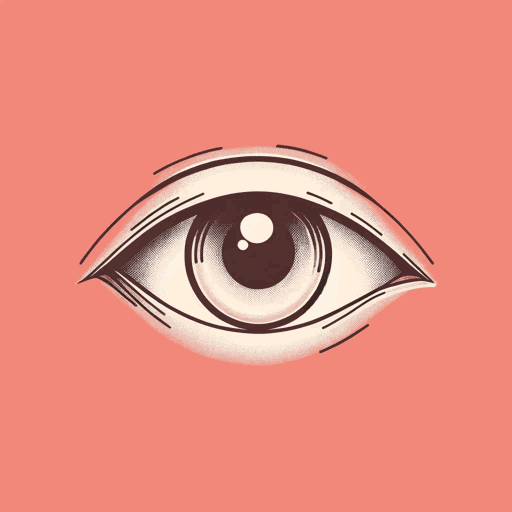
George Orwell
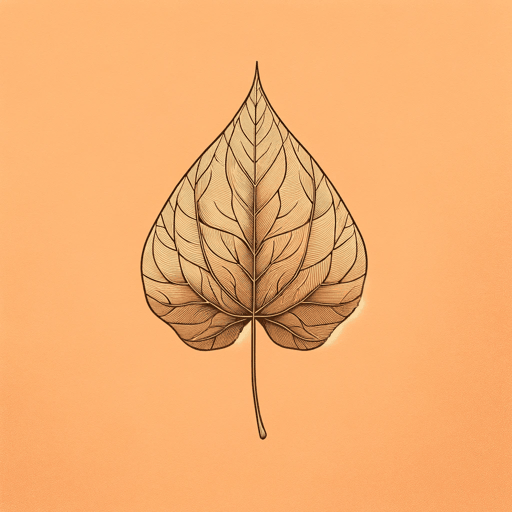
Burmese Days

Coming Up for Air

Down and Out in Paris and London
Homage To Catalonia
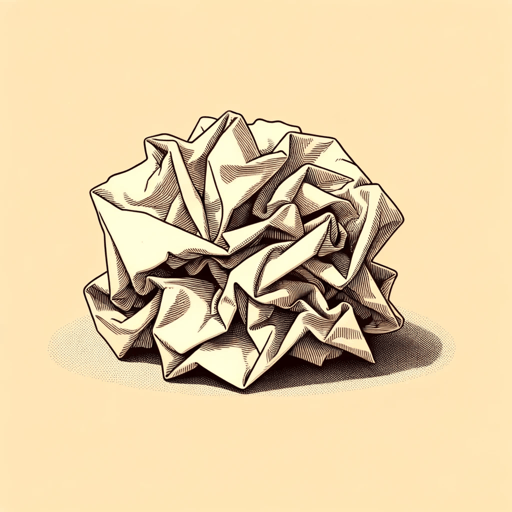
Keep the Aspidistra Flying
Politics and the English Language
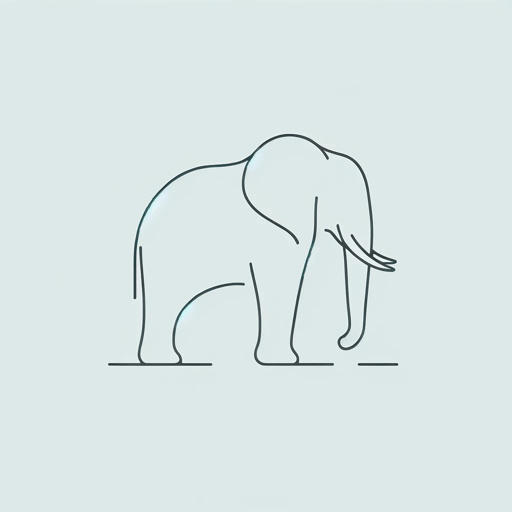
Shooting an Elephant
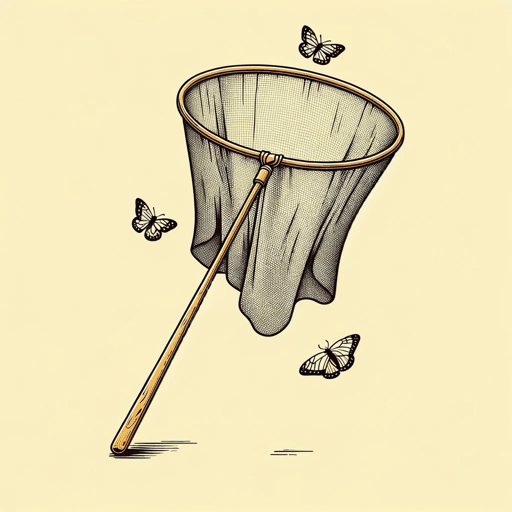
Such, Such Were the Joys
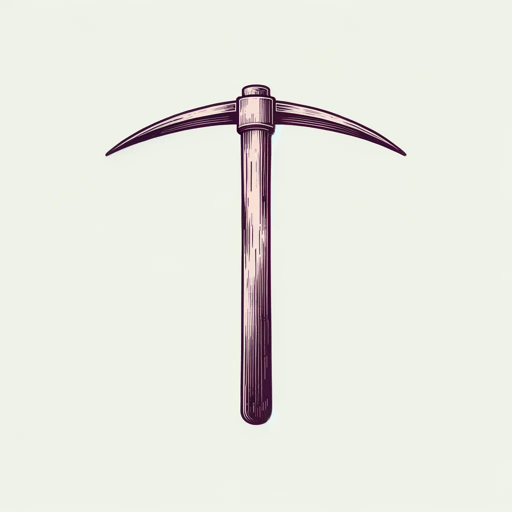
The Road to Wigan Pier

Why I Write
Featured Collections
Allegories of Modern Life
View Collection
Animals in Literature
Audio Study Guides
Banned Books Week
British Literature
Challenging Authority
European History
Fantasy & Science Fiction Books (High...
Goodreads Reading Challenge
Philosophy, Logic, & Ethics
Politics & Government
SuperSummary Staff Picks

IMAGES
VIDEO
COMMENTS
Learn how to better understand the themes and plot devices of Orwell's allegory "Animal Farm" by working through study questions. The questions cover the novel's context, characters, symbols, and historical and literary context. They also compare the novel with Orwell's other works and other dystopian novels.
Explore the themes, characters and symbolism of George Orwell's classic novel Animal Farm with these thought-provoking questions. Discuss the parallels between the animals' rebellion and the Russian Revolution, the corruption of power, the role of memory and more.
Animal FarmStudy Questions. The most important questions are highlighted. The page numbers given in some questions may differ from other editions of the book. Chapter 1. 1. Animal Farm is a metaphor for human society. What group in the human world do the farm animals represent?
Find out the meaning and significance of Animal Farm, an allegory of the Russian Revolution and its aftermath. Explore the characters, themes, and events of the novella with these questions and answers.
Animal Farm synopsis. "Animal Farm" is a thought-provoking and satirical novella by George Orwell, published in 1945. Set on a British farm, the story serves as a powerful allegory for the Russian Revolution and the rise of Stalinist totalitarianism. The novel begins when the animals of Manor Farm, led by the pigs, stage a rebellion against ...
Find five discussion questions about the allegorical novel Animal Farm by George Orwell. Explore the role of propaganda, the significance of Snowball and Boxer, and the contrast between the original and distorted commandments.
Find out the meaning, significance, and examples of various themes, symbols, and devices in Animal Farm, a satirical novel by George Orwell. Browse hundreds of questions and answers on the characters, plot, and message of the book.
Animal Farm | Discussion Questions 1 - 10. Share. How does the description of the first appearance of Old Major in Chapter 1 of Animal Farm reflect his importance to the farm, the animals, and the rebellion? When the animals go to hear Old Major's speech, his first and only living appearance in the novel, he is "ensconced" on a bed of straw ...
Generate customized discussion questions for Animal Farm by George Orwell using AI tools. Select topic, difficulty level, and audience to tailor your questions for classroom or personal use.
Get free homework help on George Orwell's Animal Farm: book summary, chapter summary and analysis, quotes, essays, and character analysis courtesy of CliffsNotes. Animal Farm is George Orwell's satire on equality, where all barnyard animals live free from their human masters' tyranny. Inspired to rebel by Major, an old boar, animals on Mr. Jones' Manor Farm embrace Animalism and stage a ...
Find summaries, analysis, themes, quotes, characters, and symbols for George Orwell's Animal Farm, an allegory of the Russian Revolution and the Communist Soviet Union. Explore the historical and literary context, the plot, and the themes of this classic novel.
Explore discussion questions regarding George Orwell's ''Animal Farm,'' a dark satire of the Russian revolution and Stalin's dictatorship. Learn about the novel's themes, characters, ideology, and connection to real-world politics.
Discussion Questions 1. "Surely there is no one among you who wants to see Jones come back?" Throughout the animals' reign on the farm, Napoleon and Squealer dangle the possibility of Jones' return as a constant danger, keeping most of the other animals in fear, and thus, submission.
Our Reading Guide for Animal Farm by George Orwell includes a Book Club Discussion Guide, Book Review, Plot Summary-Synopsis and Author Bio ... Discussion Questions: Full Version: Print: Page 1 of 4. Animal ... To this day, Animal Farm remains a haunting vision—the lessons of which might be heeded by all concerned with issues of self ...
Animal Farm STUDY GUIDE QUESTIONS. Chapters 1-3 . 1. For what purpose did Major call the meeting of the animals? 2. After they vote and decide rats are "comrades," Major summarizes his points for the animals to remember. These are the principles of Animalism: 3. What is "Beasts of England"? For what does it stand? 4.
Chapter 10 Group Discussion Questions 1. What changes have the years brought to the farm? 2. How does Orwell make fun of bureaucracy? 3. How do the animals no feel about their social order, their farm? 4. What drastic actions do the pigs use to shatter the animals' complacency? 5. All seven commandments are erased.
Animal Farm by George Orwell, first published in 1945, is a satirical allegory that explores the Russian Revolution and the subsequent rise of Stalinism. Set on a farm, the story begins with the animals overthrowing their human oppressors, led by the pigs who represent the ruling class. Initially, the animals establish a utopian society based ...
Thanks for exploring this SuperSummary Study Guide of "Animal Farm" by George Orwell. A modern alternative to SparkNotes and CliffsNotes, SuperSummary offers high-quality Study Guides with detailed chapter summaries and analysis of major themes, characters, and more. For select classroom titles, we also provide Teaching Guides with discussion and quiz questions to prompt student engagement.
The name of the lullaby that Napoleon forces the pigeons to sing to his thirty-one piglets. The idea of animal heaven propagated by Moses the raven. The setting for the story that Mollie tells to the lambs. The mountain visible on Animal Farm's horizon.
Find examples in chapter 3 that contradict this. The birds were treated equally. They use the words "we, us, together". Contradict. Pigs take all milk and apples. Everyone works, pigs sleep and don't work. -"four legs good, two legs bad". -"she was telling them that all animals were now comrades and that any sparrow who chose could of come and ...
Discussion Questions for Animal Farm are Listed. 1. "Surely there is no one among you who wants to see Jones come back?" Throughout the animals' reign on the farm, Napoleon and Squealer dangle the possibility of Jones' return as a constant danger, keeping most of the other animals in fear, and thus, submission.
The pigs are first skeptical of moving into the house, however after Squealer persuades them the pigs move into the house. They justify this by saying that they are the brains of the farm and they should have a quiet workplace. All the animals are excited about the windmill; Benjamin is not. He states merely that "'Donkeys live a long time.'".
SparkNotes